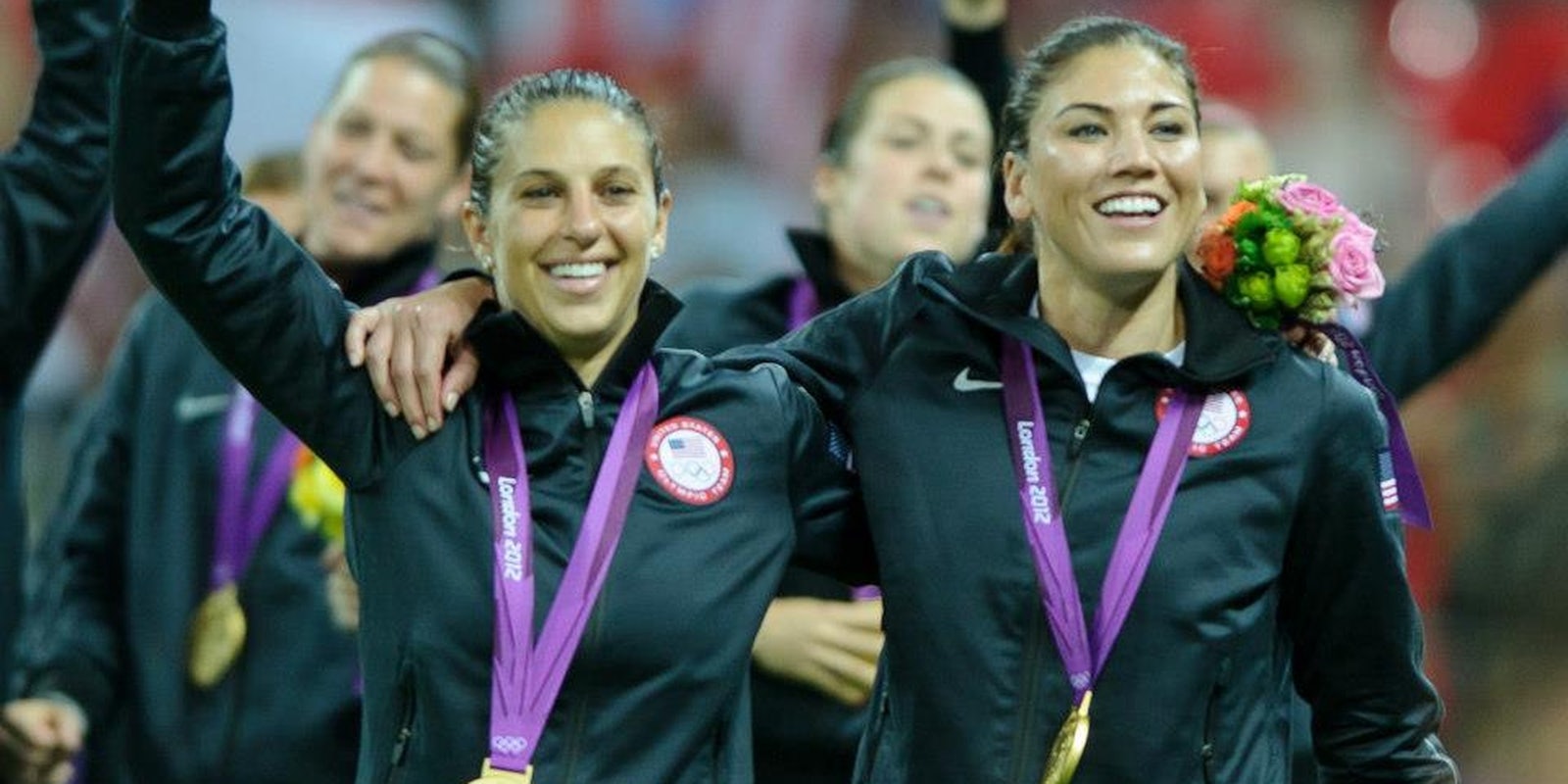On Thursday, five of the biggest soccer stars in the U.S. filed a wage discrimination complaint with the Equal Employment Opportunity Commission (EEOC) on behalf of the entire World Cup–winning women’s soccer team.
U.S. Women’s National Team (USWNT) co-captains Carli Lloyd and Becky Sauerbrunn, forward Alex Morgan, midfielder Megan Rapinoe, and goalkeeper Hope Solo all signed their names onto the complaint.
Five players signed the complaint, but the decision to file was whole-heartedly supported by the entire team. #equalplayequalpay #thegals
— Becky Sauerbrunn (@beckysauerbrunn) March 31, 2016
The filing comes eight months after 28 members of Congress sent a letter to FIFA, the international football association, demanding that it stop paying female soccer players 40 times less than male players. But the EEOC complaint Thursday is against U.S. Soccer—the American governing board—rather than FIFA.
The reason for targeting U.S. Soccer is clear: According to the complaint, the women’s national team is projected to single-handedly bring in all of the soccer profits in the country in the next year.
The day before the complaint was filed, the New York Daily News published a lengthy investigative report on the soccer wage gap. Among the disturbing revelations about international pay scales—the USWNT was paid $2 million for winning the 2015 World Cup, compared to the $35 million the German men’s team made the previous year—was a clear discrepancy in the profits brought in by American male and female players. As the Daily News reported in a follow-up story on Thursday, the women’s team has been floating U.S. Soccer for years while receiving far less compensation.
According to the complaint, U.S. Soccer had expected a combined net loss for both teams of $429,929 for fiscal year 2016, but the filing says “thanks almost exclusively to the success of the WNT, the Federation now projects a $17.7 million profit in connection with these teams.” Looking ahead to 2017, U.S. Soccer broke out numbers for the men’s and women’s teams showing a net profit of $5 million for the women, while a net loss of almost $1 million for the men.
In a statement issued by the women’s team and their attorney, Jeffrey Kessler, soccer icon Hope Solo said that U.S. men’s team players “get paid more to show up than we get paid to win major championships.”
“This is the strongest case of discrimination against women athletes in violation of law that I have ever seen,” said Kessler.
U.S. Soccer also issued a statement in response to the complaint, emphasizing the board’s disappointment in the legal action.
“While we have not seen this complaint and can’t comment on the specifics of it,” read the U.S. Soccer statement, “we are disappointed about this action. We have been a world leader in women’s soccer and are proud of the commitment we have made to building the women’s game in the United States over the past 30 years.”
U.S. Soccer’s statement fell a bit flat, however, in light of the fact that the board filed a suit against the U.S. women’s team union this February over a labor agreement—on National Girls and Women in Sports Day.
Support for the team flooded social media, with fans and players alike using the hashtag #EqualPlayEqualPay to clap back against the discriminatory wage gap.
It’s pretty simple… #equalplayequalpay pic.twitter.com/2sdOmaCKxw
— Kelley O’Hara (@kelleymohara) March 31, 2016
Historic moment. Proud of the strength of this team. #fighting #equalplayequalpay pic.twitter.com/JnAbyL8bm8
— Carli Lloyd (@CarliLloyd) March 31, 2016
https://twitter.com/DannyPage/status/715506641710387201
On her Instagram profile, forward Alex Morgan issued a statement citing overall poor conditions for female players that go beyond the outrageous wage disparity.
This is not only about equal pay – we get paid less than half of our male counterparts – but also equal treatment. We deserve to play in top-notch, grass-only facilities like the U.S. Men’s National Team, not dangerous turf fields. We want to have decent travel accommodations. We have dedicated our lives to this sport and our country and we love soccer and our fans. We think it’s time for employers to truly address the inequality and do not only what is fair, but what is right.
The case for the women’s team isn’t just based on numbers. Many fans contend that the team features some of the world’s best soccer players, regardless of gender. When former USWNT captain Abby Wambach retired last October after leading the team to a World Cup victory, she did so as the top international goal scorer of all time, male or female. Many of those goals were Wambach’s signature “headers,” scored by hitting the ball into the goal using her forehead—a move typically associated with male players.
Photo via U.S. Soccer/Facebook


